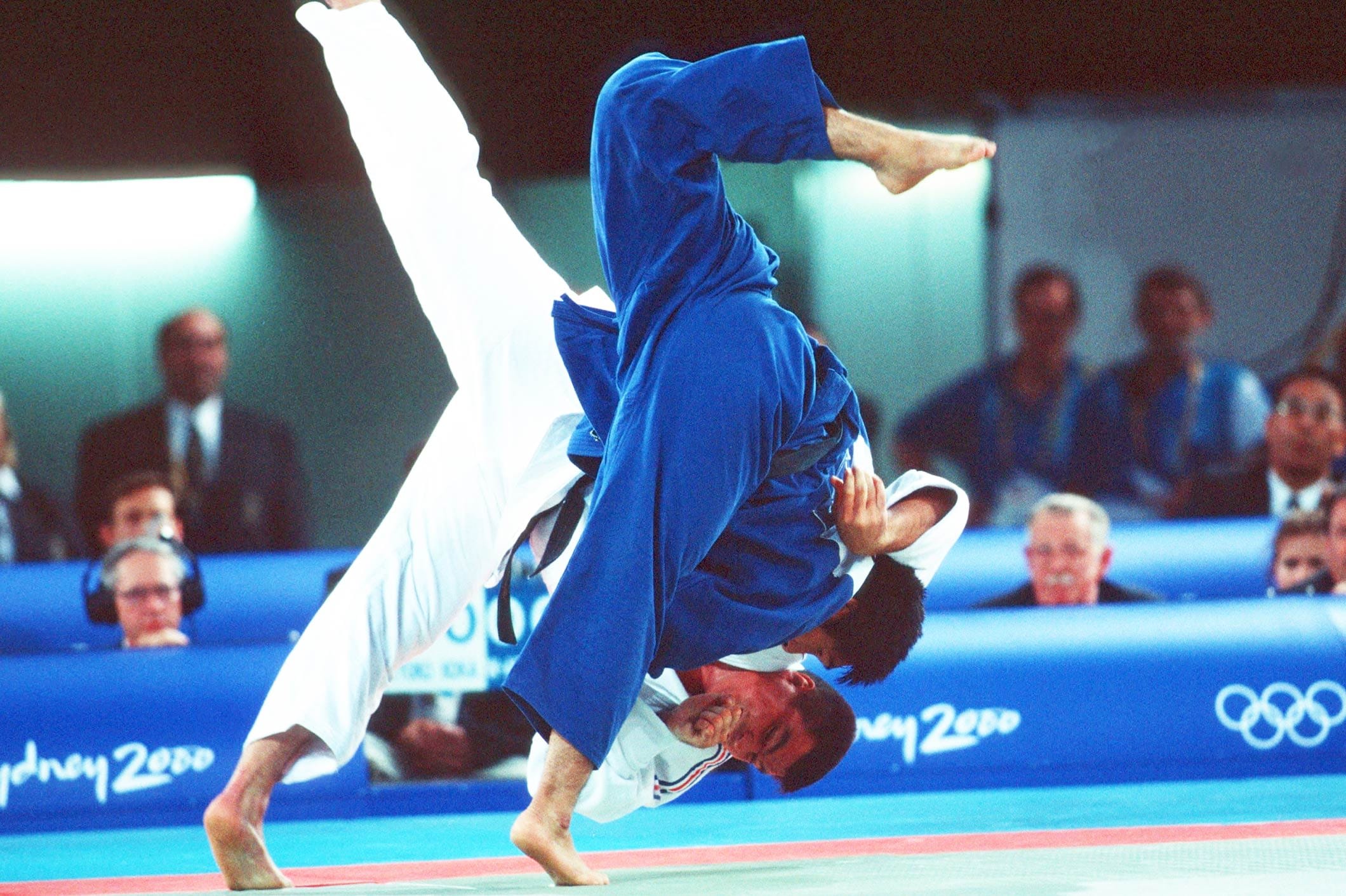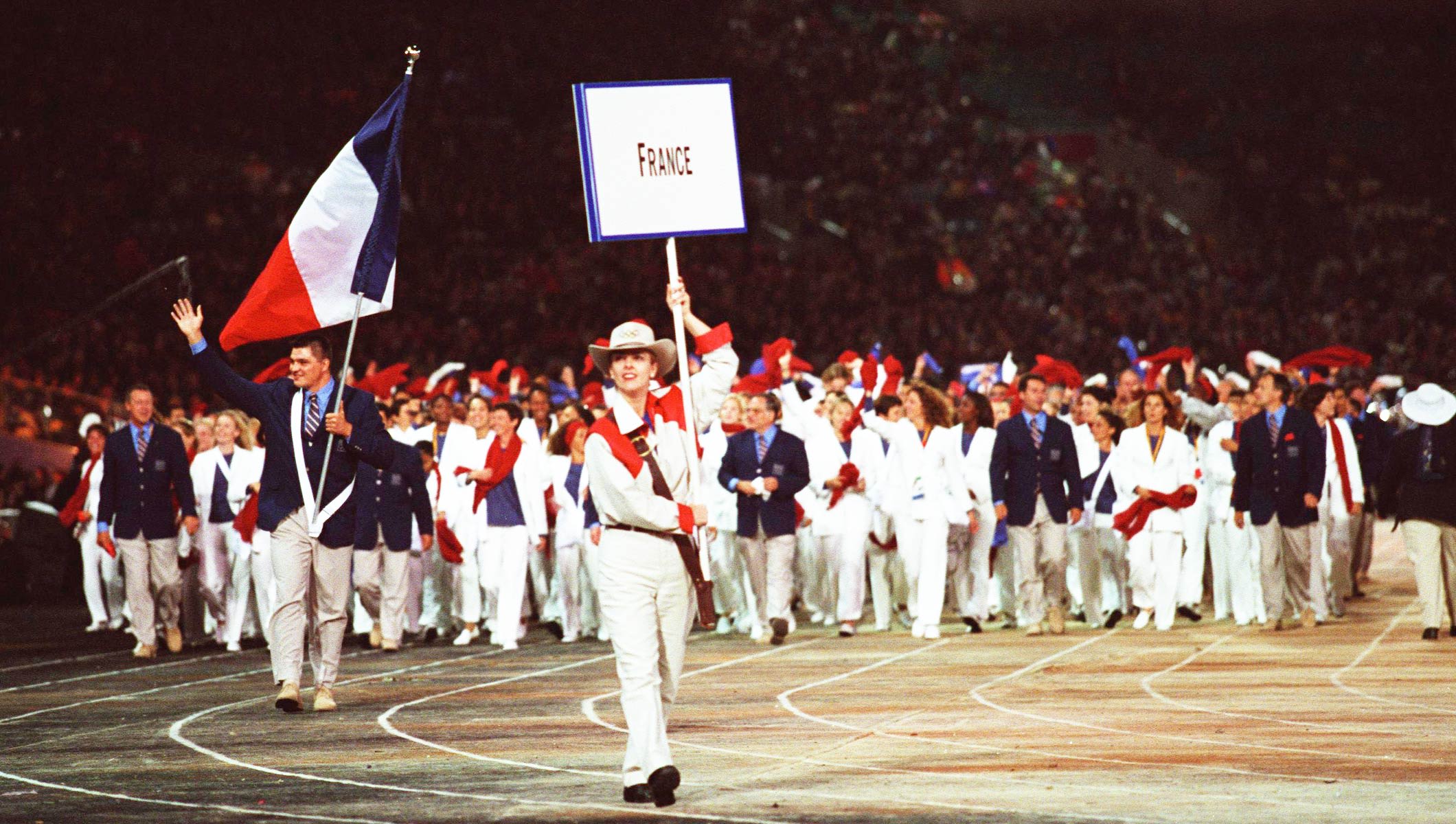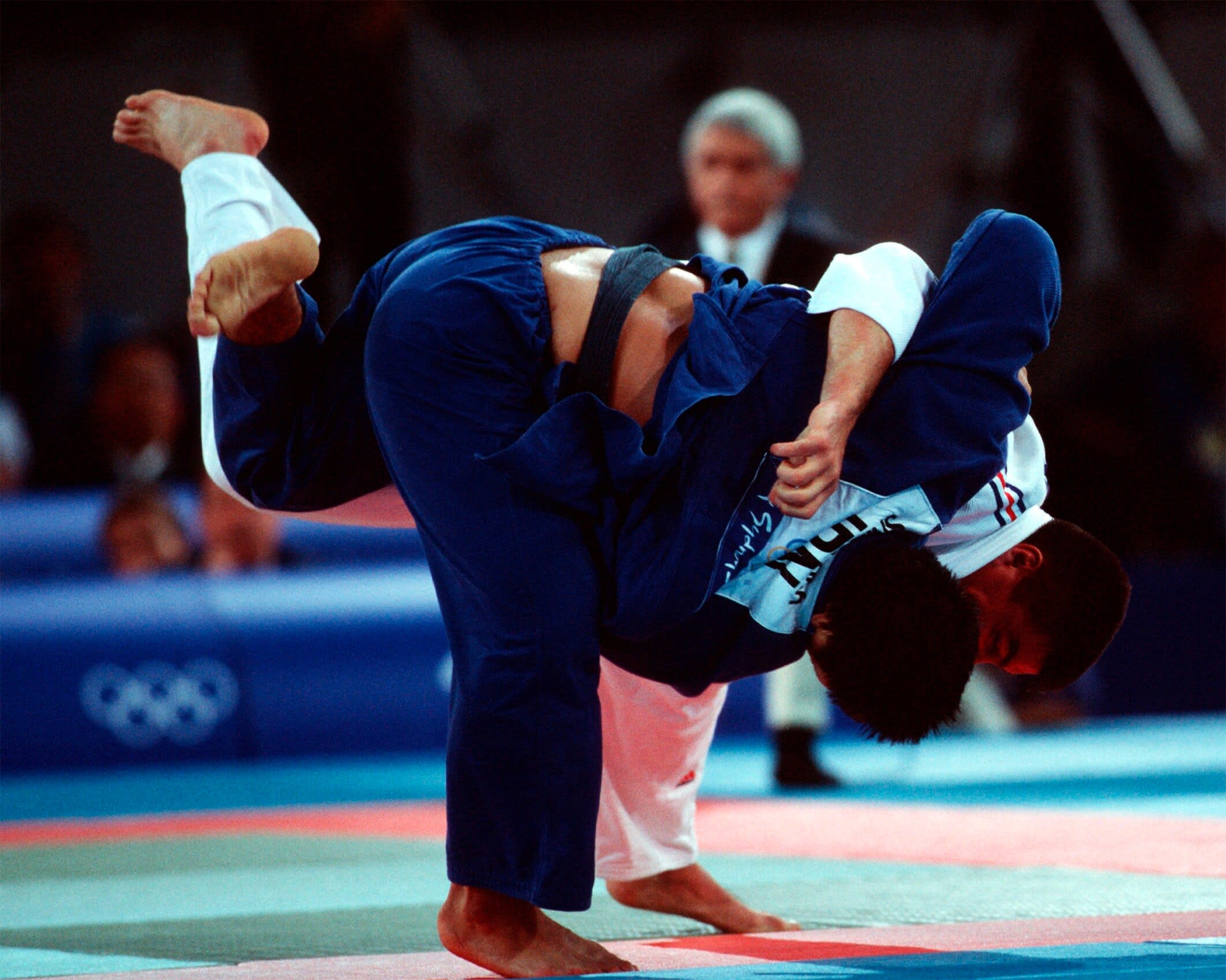David Douillet: “Over and above my titles, what I’ve taken is a message of hope”
Exactly 20 years ago, on the tatami of the Sydney Convention and Exhibition Centre at Darling Harbour, judoka David Douillet, the flagbearer for the French team, retained his Olympic heavyweight title. His road to glory, however, was strewn with obstacles. Here, he tells olympic.org about his quest for gold and the importance of the values of sharing and humanity, which have made him who he is today.
A month after your Olympic title at Atlanta 1996, you suffered a terrible motorbike accident…
Yes; that accident saw me go from having the physique of a high-level athlete to being stuck in a wheelchair. I risked having my leg amputated and I’d shattered my shoulder, which needed to be put back together, plus there was damage to my spine. In short, I wasn’t in great shape. And a year to the day after my accident, I needed to defend my world title in Paris.
That was the start of a long road to recovery, which was extremely difficult physically and mentally, with everything completely up in the air. When surgeons are telling you, “We saved your leg, but we don’t know if you’ll be able to walk again”, your rehabilitation doesn’t get off to the easiest of starts. But there were some really miraculous procedures in place among the French team’s medical staff. Marc Pujaud, in particular, got me back on track through electrical stimulation therapy. I did the therapy with my leg wrapped in a resin band to repair my nerve endings. It meant that I was able to walk again once they removed the resin casing. They did the same thing for my shoulder, and it cut down my recovery time by a third.
How did you manage to win your fourth world title, in front of a home crowd?
In February, I got back on the tatami and properly started my physical training. I arrived at the 1997 World Championships at 70 per cent physical capacity, and I was having a hard time of things. In the semi-final, I was up against the imposing Pan Song from China, and I dislocated my other shoulder. In the final against Shinichi Shinohara, I had only one arm; I knew it was going to be complicated and that I’d find it tough to bring him down. So I turned it into a tactical fight. I attacked more than him; he of course kept incurring penalties, and ended up getting disqualified. I made do with what I had, which wasn’t very much. It was all about being mentally strong.
Tell us what happened next.
The road to Sydney was getting more and more difficult. I’d been suffering from back pain since 1994, and the motorbike accident certainly didn’t help in that regard. It was really tough to train. I was forced to go about it differently and use every trick in the book; I spent my time with the osteopath, who single-handedly kept me going until the Games. Three or four weeks before I headed out to Australia, I badly messed up a move, which led to me seriously twisting my forearm and rupturing the capsule of my elbow joint. I finished my preparations with an elbow that wouldn’t stop swelling up. In the lead-up to the Games, I was getting a grapefruit worth of fluid drained out of it twice a day!

On 15 September 2000, you led your delegation into the stadium, carrying the flag…
Doing the lap of the stadium with the flag was genuinely just as enjoyable as winning an Olympic event. It was incredible, really crazy. And at the same time, there’s this terrible pressure because loads of people tell you that flagbearers don’t win medals. There are plenty of examples: my friend Philippe Riboud in fencing in 1988, or Jean-François Lamour in 1992. But then there was also Marie-José Pérec, who was the flagbearer in 1996 and did the 200m-400m double in those Games, so that was reassuring.
Being the flagbearer for your country is a unique moment in your life, when you’ve got the whole delegation behind you. The atmosphere in which everything happens is extraordinary. We were all gathered there in a stadium outside, waiting to do our lap, and it was magical. Every country was singing their national anthem; you could feel a bond, a sense of fraternity, between all the athletes. Then they immediately directed us into the tunnel that led out into the stadium. That’s when you tell yourself that every step counts. Thousands of people were watching, and behind you you’ve got the whole delegation; it was just magical. Then came the lap of the stadium, which wasn’t quite 400m because we then gathered together in the centre. You think to yourself, “That all happened so quickly!” You really have to savour each step!

How was the week between then and your competition?
Thinking back now, it feels like it lasted only a day. I do remember having long conversations with friends about what we were going to do afterwards. I knew that I was going to retire, and we spoke about that a lot.
Tell us about your route to the gold medal in Sydney.
On the morning of the competition, my elbow froze up in the shower. I set off for Darling Harbour praying that it wouldn’t happen again during my competition. And then my first-round opponent, Douglas Cardoso from Venezuela, forfeited the match! I was really annoyed! I’d said to myself that fighting him would help me fine-tune my performance so that I’d be raring to go in the second round. And he was a no-show! That was a real loss. This was going to be my last ever competition. It was like being in the restaurant of a top chef and having someone take away one of the courses, and not being able to eat it for my final meal.
I took on Turkey’s Selim Tataroğlu in my first bout, and I beat him with an ippon. I remember better the quarter-final against Belgium’s Harry Van Barneveld or the semi-final against Estonia’s Indrek Pertelson. Pertelson was the top dog coming into the match: he hadn’t lost against a right-hander for at least three or four years. That summer, he’d come to train in France and we’d fought each other. So I’d seen him then, and knew it would be really tough. In the semi-final, I set a trap for him, and he fell right into it. I made him think that I’d lost the bout because of my guard, but in reality I took advantage of the situation to attack with a guard I didn’t normally use; he was completely taken by surprise by my uchi mata, which I sprang on him with a totally wrong kind of guard. He went to pieces. I won with an ippon in less than a minute.
In the final against Shinichi Shinohara, there was a moment in the bout where you launched an attack that he tried to block. You both fell to the ground and there was a moment of confusion. Talk us through what happened.
At that moment, I could see the face of his coach, Saïto; he was saying it was an ippon, and Shinohara thought he’d won, but I knew that I was the one who’d launched the attack and that it hadn’t been a real countermove, so I was stunned. I was expecting to be the victim of an injustice. I looked over at the judges, and thought I was about to be the victim of a classic refereeing mistake. And instead, they awarded me a yuko, which I felt was the right decision. And then I just sensed that my opponent was done for; that he hadn’t recovered from his semi-final against Russia’s Tamerlan Tmenov. So I took charge of the bout. I countered one of his attacks; he was running on empty... I scored a second yuko and it was game over. But right from the off I realised that I was in command of this final because he wasn’t quite there physically. I sensed it straight away, and he knew it too.
So you became a double Olympic champion; an extremely rare feat in a heavyweight event...
It was like having Niagara Falls come crashing down on your head in one go. It felt completely unreal and overwhelming; I couldn’t handle the emotion of it all. So you focus on really basic things, like your family, your coaches, your friends. You think about those essential things that got you where you are. I remember a journalist asking me after the fight if it was the best day of my life. I replied: “No, the best day of my life was when my children were born.” It’s really difficult to process everything that comes with winning. And then there’s the media circus, which is complicated on a human level, if you can call it human at all.
Afterwards, I wasn’t able to make the most of the rest of the Games. I had to go straight back to France for an elbow operation. So I watched the French basketball team win the silver medal at home, which was annoying, as I would have liked to be with them. I was forced to leave the party early.

How has your high-level sporting career helped you in life since?
I’ve noticed how it’s all helped in my everyday life – both professionally and with who I am as an individual. It’s the values and reflexes that date back to the day, when I was a child, when I tied a white belt around my waist for the first time. It was at that moment that the construction of me as an individual began, and this continued right up until the Games in Sydney. It was a journey that defined my values, my reflexes and my entire vision as a man.
All the medals I’ve won are not what I’ve taken most from all this. In reality, the only thing that matters is the message of hope for the future of humanity; it was the Olympic Games that opened my eyes to this. The embodiment of this is the Olympic Village: it’s there that you live and share. All of humankind is brought together in one place: our wealth of differences are what make up our planet. And we’re in a position to put on the greatest of shows for the world.
Why are 10,000 women and men capable of putting on this show? Because they have that same bedrock of values, because they’ve all suffered, because they’re all passionate about what they do, because they’ve all understood that you need to be humble to make it to the Olympic Village and compete at the Games. Because they all know that you need to have goals, respect others and be able to put in the work. It doesn’t matter who you are, where you’re from, or what your religion or sexual orientation is. We all have the same values, and we’re all capable of doing wonderful things. That’s the most powerful thing I took from my career. Once you realise that, you say to yourself: “I’ve got a family, I’ve got children, we live on a ball called Earth; and there are wars, and people who kill each other, who are jealous and who don’t respect each other”, but if we can ultimately manage to share, and understand each other with this bedrock of common values, we are capable of living together. And that’s what’s most important to me.
There’s a famous photo taken in 1997 in which you’ve got your hand on the shoulder of an eight-year-old boy. His name was Teddy Riner...
When they introduced that kid to me, I was supposed to present him with a green or blue belt... I can’t quite remember. And his judo teacher asked me to have a little word with him because he was full of bounce, really fired up and bursting with energy, but a bit disruptive. It was the first time I’d seen him; I couldn’t possibly imagine what he’d go on to achieve. I said to him something along the lines of: “You’re lucky you do judo; if you really put all this excess energy into your training, you’ll calm down, you’ll see.” Today, now that he’s got his sights set on a third Olympic title at Tokyo 2020, my advice to him is: “Try and go all the way to Paris 2024.” That’s a bit of selfishness on my part; I was lucky enough to take part in the World Championships in Paris, but I would have dearly loved to compete in the Games on home soil! So it’s something I will keep saying: “It’s for you, for judo, for France. If you can go all the way to Paris, do it!”